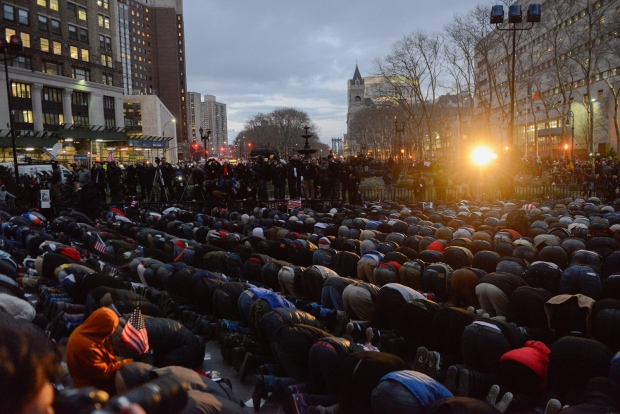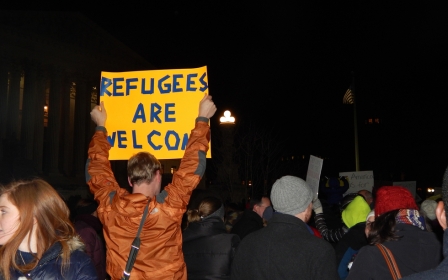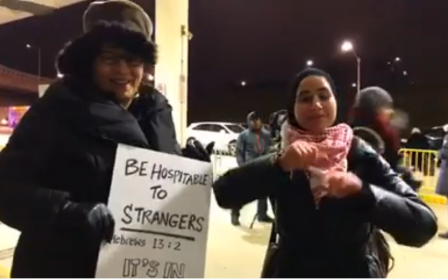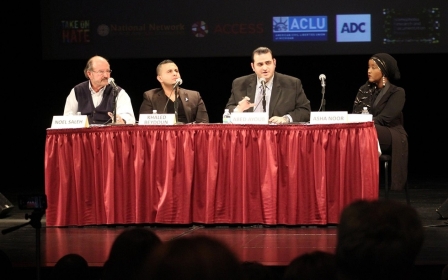No milk in Brooklyn: Yemeni shops close in huge protest against ban
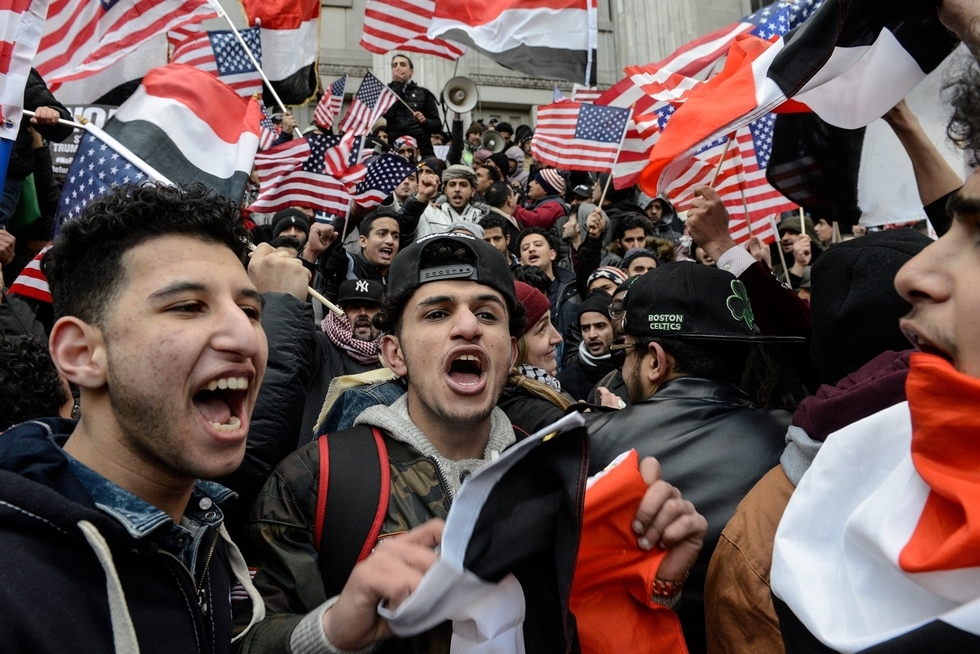
BROOKLYN, New York - Yemeni businessmen typically work 7 days a week to make sure New Yorkers get their carton of milk at 4 am but, for one day, this service was halted in the name of protest.
Thousands of Yemenis braved the cold in Brooklyn on Thursday evening to protest against President Trump’s executive order banning nationals of the seven Muslim-majority countries, including Yemen.
And their protests did not go unnoticed.
Yemenis are well-known throughout New York for owning small businesses, including grocery stores, bodegas, smoke shops and delis, the large number of shutdowns resounded throughout the city.
Speaking to Middle East Eye, protest organiser Rabiyaah Althaibani said, “One thousand shops were closed today.”
Certainly, some residents were unable to get their early morning milk, as numerous shopkeepers chose to close their shops for the whole day, while others shut their doors starting at midday.
Even the schools of Brooklyn and Queens felt emptier today as parents kept their kids out of school to protest during the strike. One Brooklyn secondary school teacher said: “I love my Yemeni students. I’m here for them. They are like walking royalty.”
This solidarity with the Yemeni community was strongly felt in the rally that followed.
Following the day-long strike, the shop owners, their families, and the Yemeni community of New York gathered outside Brooklyn Borough Hall for a rally to raise awareness about Trump’s ban.
With the sun settting on the gathering of New Yorkers, the evening began with a moving recitation of the Athaan – the Islamic call to prayer. Recited into a microphone, the Yemeni imam led prayers for a half hour as thousands of Yemeni men and women prayed behind him – a touching moment that moved many to tears.
After the prayer, the participants turned away from the east to face the other direction where a wide range of speakers had gathered on the steps of Brooklyn Borough Hall.
Mexican-Americans preached solidarity. African-Americans spoke about brother- and sisterhood. Both a Jewish rabbi and a Buddhist monk made appearances to express their support for the Yemenis of New York City. All within the backdrop of both Yemeni and American flags waving throughout the crowd.
Politicians, advocates, and religious leaders alike all shared their words of encouragement for the largest gathering of Yemenis in the history of New York City.
Linda Sarsour, a well-known Palestinian-American political activist who co-organise the Women’s March, capped off the night’s speeches. Delivering her words in both Arabic and English, Sarsour sparked off widespread cheers as she told the Yemeni crowd, “you are the best people I know.”
READ: Women's March leader Linda Sarsour defended after online attacks
Then, switching to English, she continued, “Today you made not only the Yemeni and Muslim community proud. You made New York City proud. New York City would not be New York City without you” – a statement that led the crowd to break out chanting “U-S-A!”
Patriotic fervour for both America and Yemen filled the air as participants walked away in elated mood.
Speaking to Middle East Eye after the rally, organiser Althaibani shared her satisfaction, “We had such a great turnout. There was so much excitement.”
All of this excitement began out of opposition: newly inaugurated president Donald Trump sparked controversy by signing an executive order last week, which banned immigration from seven countries for at least 90 days.
The order was met with widespread criticism, as newly-arrived nationals from the seven countries were detained at airports throughout America. Lawyers rushed to the scene and at 9pm last Saturday, federal judge Ann Donnelly of New York issued a temporary stay for immigrants from these countries.
Yemen’s Saudi-backed government expressed its own condemnation of the ban, which it believes “supports the stance of extremists.”
Additionally, only the day before last night’s protest, news broke of a US special forces raid in Yemen which resulted in the deaths of 14 Al Qaeda-linked militants, one US Navy commando, but also a “number of civilians.”
One of these civilians was an eight-year-old girl named Nawar, daughter of previously killed radical Yemeni-American cleric Anwar al-Awlaki.
Still, all Yemenis at the protest focused on the executive order.
“I’m an American citizen,” one Yemeni told Middle East Eye, while another said, “I feel comfortable in New York. I want to stay.”
READ: Not everyone loses from Trump's Muslim ban
Indeed, this sense of loyalty to their community was one that impacted the Yemeni business owners even in their protest.
“Originally, we considered starting the shutdown at 8am, but the grocers they made it clear they wouldn’t be willing to close if that meant their regulars wouldn’t get their morning coffee,” explained Debbie Almontaser, board member of the Muslim Community Network and one of the rally organisers.
“Even when their lives have been turned upside down, they refused to disrupt the lives of the very people they serve daily.”
Many other New Yorkers surely feel the same way, since on that day, the city’s economy just wasn't the same without the Yemenis linking everything together.
Middle East Eye propose une couverture et une analyse indépendantes et incomparables du Moyen-Orient, de l’Afrique du Nord et d’autres régions du monde. Pour en savoir plus sur la reprise de ce contenu et les frais qui s’appliquent, veuillez remplir ce formulaire [en anglais]. Pour en savoir plus sur MEE, cliquez ici [en anglais].


